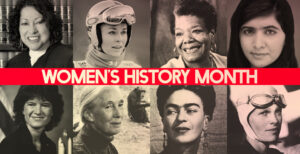Women’s History Month
By Sharon Schweitzer
Women’s History Month began as a local celebration in Santa Rosa, California. The Education Task Force of the Sonoma County (California) Commission on the Status of Women planned and executed a “Women’s History Week” celebration in 1978. The organizers selected the week of March 8 to correspond with International Women’s Day. The movement spread across the country as other communities initiated their own Women’s History Week celebrations the following year.
In 1980, a consortium of women’s groups and historians—led by the National Women’s History Project (now the National Women’s History Alliance)—successfully lobbied for national recognition. In February 1980, President Jimmy Carter issued the first Presidential Proclamation declaring the Week of March 8th,1980 as National Women’s History Week.
Subsequent Presidents continued to proclaim a National Women’s History Week in March until 1987 when Congress passed Public Law 100-9, designating March as “Women’s History Month.” Between 1988 and 1994, Congress passed additional resolutions requesting and authorizing the President to proclaim March of each year as Women’s History Month. Since 1995, each president has issued an annual proclamations designating the month of March as “Women’s History Month.”
The National Women’s History Alliance selects and publishes the yearly theme. The 2024 Women’s History Month theme established by The National Women’s History Alliance is titled: “Women Who Advocate for Equity, Diversity and Inclusion.” The theme recognizes women throughout the country who understand that, for a positive future, we need to eliminate bias and discrimination entirely from our lives and institutions.
Additionally, March 8th is designated as International Women’s Day. It is celebrated in many countries around the world. It is a day when women are recognized for their achievements without regard to divisions, whether national, ethnic, linguistic, cultural, economic or political.
Since those early years, International Women’s Day has assumed a new global dimension for women in developed and developing countries alike. The growing international women’s movement, which has been strengthened by four global United Nations women’s conferences, has helped make the commemoration a rallying point to build support for women’s rights and participation in the political and economic arenas.
Officially recognized by the United Nations in 1977, International Women’s Day first emerged from the activities of labor movements at the turn of the twentieth century in North America and across Europe. By 2014, it was celebrated in more than 100 countries and had been made an official holiday in more than 25.
The first National Woman’s Day was observed in the United States on February 28th,1909. The Socialist Party of America designated this day in honor of the 1908 garment workers’ strike in New York, where women protested against working conditions.
By 1913, International Women’s Day also became a mechanism for protesting World War I. As part of the peace movement, Russian women observed their first International Women’s Day on the last Sunday in February. Elsewhere in Europe, on or around March 8th of the following year, women held rallies either to protest the war or to express solidarity with other activists.
After World War II, March 8th started to be celebrated in a number of countries. In 1975, during the International Women’s Year, the United Nations began celebrating March 8th as International Women’s Day. Two years later, in December 1977, the General Assembly adopted a resolution proclaiming a United Nations Day for Women’s Rights and International Peace to be observed on any day of the year by Member States, in accordance with their historical and national traditions. Since then, the United Nations and their agencies have worked tirelessly to secure gender equality worldwide with great outcomes achieved- in 1995 the Beijing Declaration and Platform for Action, a historic roadmap signed by 189 governments, focused on 12 critical areas of concern; and the inclusion of Goal 5 “Achieve gender equality and empower all women and girls” in the 2030 Agenda for Sustainable Development.
Photo by denverlanguageschool.org
Sharon Schweitzer JD, is a diversity and inclusion consultant, cross-cultural trainer, etiquette expert, and the founder of Access to Culture. In addition to her accreditation in intercultural management from the HOFSTEDE Centre, she is an attorney and mediator. Sharon served as a Chinese Ceremonial Dining Etiquette Specialist in the documentary series Confucius was a Foodie, on Nat Geo People. Her Amazon #1 Best Selling book in International Business, Access to Asia: Your Multicultural Business Guide, won a coveted Kirkus Star, and was named to Kirkus Reviews’ Best Books. She’s a winner of numerous awards, including the British Airways International Trade Award at the Greater Austin Business Awards.
#SharonSchweitzer, #AccesstoCulture, Access2Culture, #InternationalCelebration, #AccesstoAsia, #GlobalEtiquette, #Cross-CulturalTrainer, #InterculturalCommunication, #InternationalCommunication, #Interculturalist, #Etiquette, #CultureExpert, #Speaker, #KeynoteSpeaker, #WomenHistoryMonth, #WomensRights, #InternationalWomensDay, #Equity, #Diversity, #Inclusion, #UN, #NationalWomensHistoryAlliance


Leave A Comment